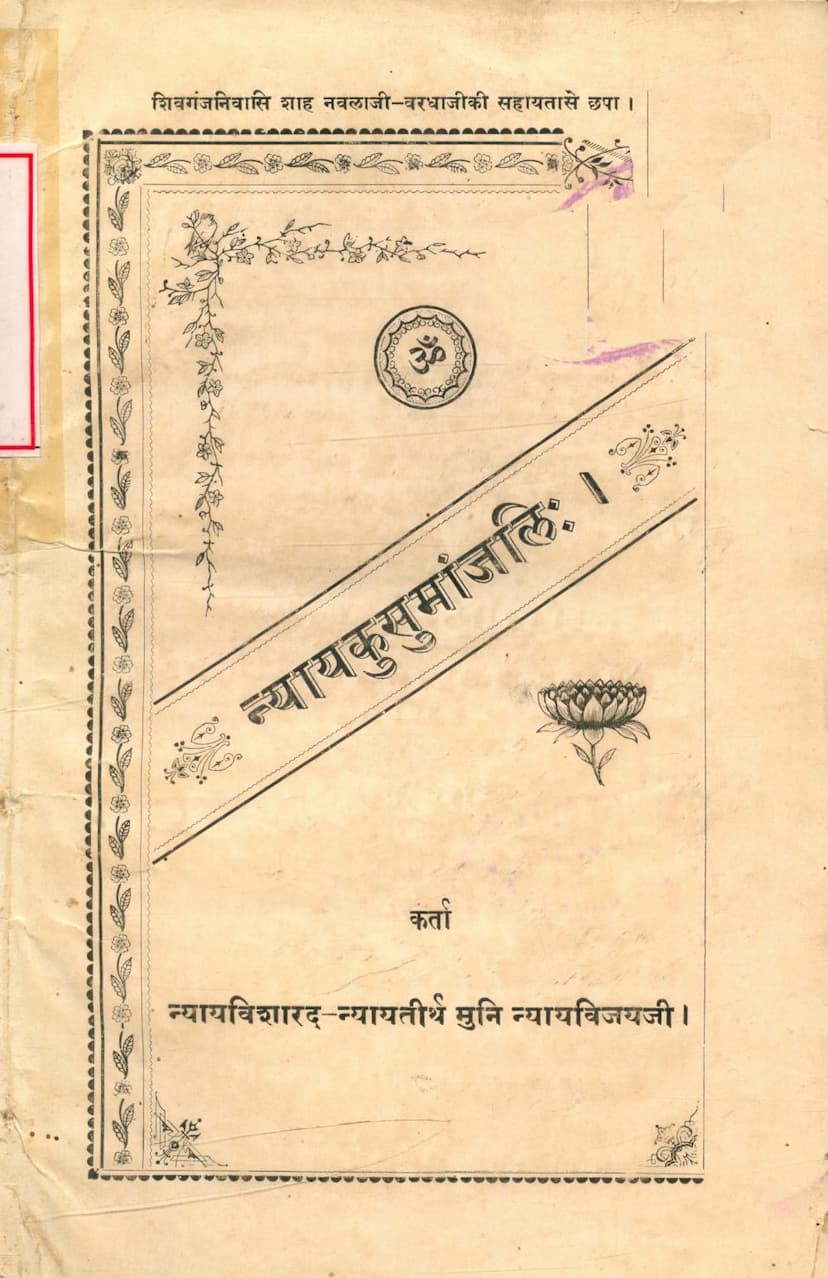Nyaya Kusumanjali
Added to library: September 2, 2025

Summary
This is a comprehensive summary of the Jain text "Nyaya Kusumanjali" by Muni Nyayvijayji, based on the provided pages:
Book Title: Nyaya Kusumanjali (न्यायकुसुमाञ्जलिः) Author: Muni Nyayvijayji (मुनि न्यायविजयजी) Publisher: Shaha Navalaji Vardhaji (शाह नवलाजी-वरधाजी) Publication Year: 1914 (Vir Samvat 2440) Edition: Second Edition Printing Press: Nirnaya-sagar Press, Bombay
Overall Scope and Purpose:
"Nyaya Kusumanjali" is a significant Jain philosophical work that aims to elucidate and defend the principles of Jainism, particularly its epistemology and metaphysics. The author, Muni Nyayvijayji, states that the work is inspired by the tradition of earlier Jain Acharyas and is presented in five "Stabakas" (sections or chapters). The book seeks to explain the profound and often complex truths of Jain philosophy in a way that can be understood and appreciated by seekers of knowledge.
Structure and Content (Stabaka-wise Summary):
The book is structured into five "Stabakas," each addressing distinct aspects of Jain philosophy and refuting opposing viewpoints:
-
First Stabaka (प्रथमः स्तबकः):
- Mangala (Auspicious Invocation): Begins with eight auspicious verses.
- Nature of Liberation: Discusses the duality of liberation (moksha) and explains the state of a living liberated soul (Jivanmukti).
- Omniscience (Sarvajna Siddhi): Argues for the existence of omniscience.
- Kevalin's Sustenance: Explains how an omniscient being (Kevalin) sustains themselves, including the concept of eating (Kavalāhāra).
- Female Liberation: Affirms the possibility of women attaining liberation.
- Mahavir Puja: This Stabaka also contains a section dedicated to the worship of Lord Mahavir, highlighting his life and virtues through verses.
-
Second Stabaka (द्वितीयः स्तबकः):
- Refutation of Creationism: Critiques the concept of a creator God and the idea of creation by divine will or compassion.
- Rejection of Other Philosophies: Systematically refutes the views of various non-Jain philosophical schools, including:
- Shunyavada (Nihilism): The doctrine of emptiness.
- Bauddha (Buddhism): Particularly their theories of momentariness and non-self.
- Sankhya: Their concept of Purusha and Prakriti.
- Mayavada (Illusionism): The idea that the world is an illusion.
- Validation of Jain Principles: Defends the existence of the soul (Jiva), the materialistic nature of karma (Paugalyatva), the refutation of the soul's pervasiveness (Vyapakata) and immutability (Kautathya).
- Nature of Sound: Argues against sound being an attribute of space (Akasha) and critiques theories that view sound as merely manifested. It also establishes sound's meaning-conveying capacity.
- Dravyatva of Darkness: Argues for the substancehood (Dravyatva) of darkness.
-
Third Stabaka (तृतीयः स्तबकः):
- Theory of Knowledge (Pramana): Details the different sources of valid knowledge recognized by various philosophical systems and then elaborates on the Jain perspective of Pramana.
- Naya, Saptabhangi, and Syadvada: Explains the Jain concepts of Naya (standpoints), Saptabhangi (the sevenfold prediction), and Syadvada (the doctrine of conditioned predication).
- Six Substances (Sad Dravya): Lists and describes the six fundamental substances of the universe according to Jainism.
- Universality of Jainism: Argues that other philosophies are based on single standpoints (Ekanaya), while Jainism encompasses all standpoints (Sarvanaya).
-
Fourth Stabaka (चतुर्थः स्तबकः):
- Critique of Violence (Hinsa): Condemns violence, particularly in the context of Vedic sacrifices.
- Authenticity of Vedas: Argues for the human origin of the Vedas and questions the justification of violence within them.
- Debates on Rituals: Discusses and critiques practices like tree worship, ancestor veneration, reverence for cows, and Agnihotra.
- Characteristics of Deities, Gurus, and Dharma: Defines the essential nature of God, Guru, and Dharma.
- Methods of Worship: Explains the proper methods of worshipping the Supreme Being through name, symbolic representation, substance, and mental devotion (Namasthapana-dravya-bhava).
- Idol Worship (Murtipuja): Defends the practice of idol worship within Jainism.
-
Fifth Stabaka (पञ्चमः स्तबकः):
- Path to Liberation: Illuminates the path to moksha.
- The Nine Tattvas (Navatattva): Describes the characteristics of the nine fundamental realities in Jainism.
- The Soul (Jiva): Discusses the nature of the soul and its infinitude.
- Rebirth of the Liberated: Refutes the possibility of the liberated soul returning to the cycle of birth and death.
- Dharma of Monks and Laypeople: Provides an overview of the conduct and duties of monks (Sadhu) and lay followers (Shravaka).
- Nature of Brahmacharya and Liberation: Explains the state of Brahmacharya and the nature of liberation.
- Supreme Bliss in Liberation: Affirms the attainment of supreme bliss (Paramananda) in liberation.
- Worship of the Vitaraga: Advocates for the worship of the Vitaraga (one who has conquered passions) as being rational and meaningful.
Author's Intent and Approach:
Muni Nyayvijayji expresses humility regarding the profundity of Jain scriptures, acknowledging his own limitations. However, driven by his devotion to the divine and a desire to share the nectar of knowledge with earnest seekers, he has undertaken this work. He emphasizes the importance of approaching the text with an open mind, free from prejudice, to truly grasp its essence. He acknowledges his debt to his guru, Shri Vijaydharmasuriji, for his guidance and support in composing this work. He also notes that his "Nyaya Kusumanjali" is structured similarly to the "Nyaya Kusumanjali" by Acharya Udayana, but with a different meter (Shardulavikridita) and without an accompanying commentary.
Key Themes and Defense of Jainism:
The "Nyaya Kusumanjali" serves as a strong defense of Jain philosophy. It systematically addresses and refutes criticisms and alternative theories from other schools, particularly concerning:
- Theology: The absence of a creator God in Jainism is a central theme.
- Epistemology: The validity and nature of knowledge sources (Pramanas) are thoroughly examined.
- Metaphysics: The existence of the soul, karma, and the cyclical nature of existence are fundamental.
- Ethics and Conduct: The importance of non-violence (Ahimsa), self-control, and proper conduct for monks and laypeople are highlighted.
- Philosophy of Religion: The justification for devotional practices and the nature of the divine are explored.
In essence, "Nyaya Kusumanjali" is a rigorous philosophical treatise designed to illuminate and defend the Jain worldview, offering a comprehensive analysis of its core tenets and a robust rebuttal of opposing doctrines.